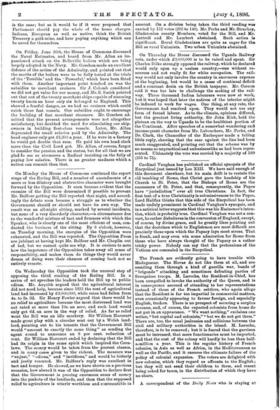On Wednesday the Opposition took the unusual step of opposing
the third reading of the Rating Bill. In a series of set speeches the leaders held the Bill up to public odium. Mr. Asquith argued that the agricultural interest did not need help, because since 1815 the rent of agricultural land had increased by £3,000,000, while rates had fallen from 4s. to 2s. 3d. Sir Henry Fowler argued that there would be no relief to agriculture because the most distressed land was not rated at more than 108. an acre, and such land would only get 6d. an acre in the way of relief. As far as relief went the Bill was an idle mockery. Sir William Harcourt made great play with a circular sent out by a Welsh land- lord, pointing out to his tenants that the Government Bill would "amount to exactly the same thing" as sending the agent round to announce an 8 per cent. reduction of rent. Sir William Harcourt ended by declaring that the Bill had its origin in the same spirit which inspired the Corn- laws. The money would be taken from the poorest classes, and in many cases given to the richest. The measure was "unjust," "odious," and "invidious," and would be bitterly and justly resented. Mr. Balfour's reply was excellent in tact and temper. He showed, as we have shown on a previous occasion, how absurd it was of the Opposition to declare first that the Government is pouring enormous sums of money into the pockets of the landlords, and then that the supposed relief to agriculture is utterly worthless and contemptible in amount. On a division being taken the third reading was carried by 152 votes (292 to 140). Mr. Perks and Mr. Strachey, Gladstonian county Members, voted for the Bill, and Mr. Luttrell and Mr. Lambert abstained. Such action is significant. Rural Gladetonians are quite as eager for the Bill as rural Unionists. Two urban Unionists abstained.










































 Previous page
Previous page